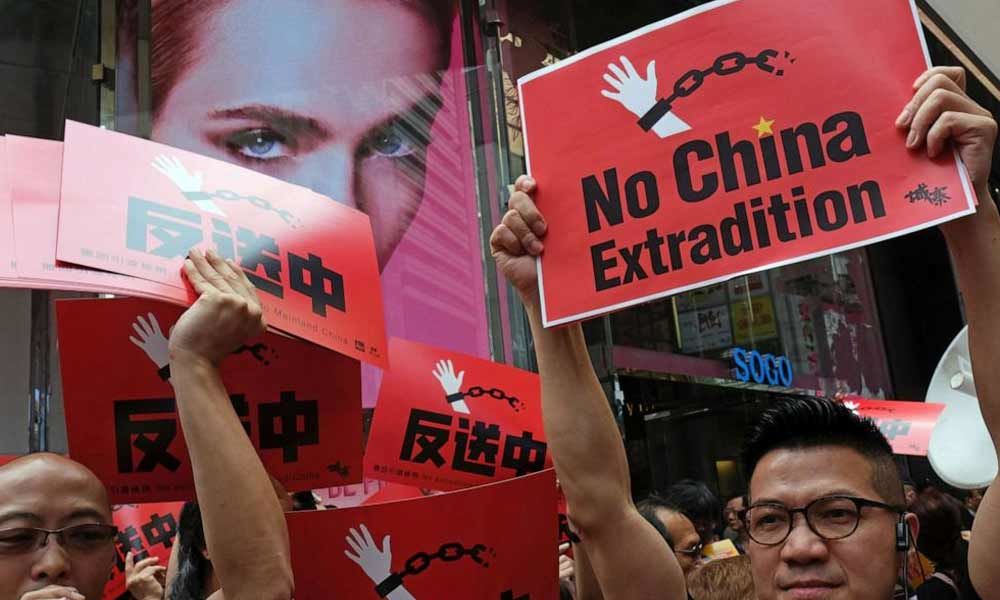Live
- Poster war on as parties compete for voter attention
- Many dams, tanks filled as rains batter Tirupati dist
- Mayawati, Akhilesh condemn damage to Constitution replica
- Mann slams Centre over ‘one nation, one election’
- Techie suicide case: Mother-in-law flees Jaunpur home
- State government to Supreme Court: New guidelines on how to apply anti-gangster law in UP
- CM Chandrababu to unveil Vision 2047 document today in Vijayawada, traffic restrictions imposed
- State-level LIMES-2k24 inaugurated
- UP to establish ‘Har Ghar Jal’ village at Mahakumbh 2025
- NDA needs support of 361 LS MPs: Cabinet gives nod to bill for 'one nation one election'
Just In

China on Saturday said it supports the Hong Kong leader's decision to suspend a controversial bill that would allow extraditions to China, following massive protests.
Beijing: China on Saturday said it supports the Hong Kong leader's decision to suspend a controversial bill that would allow extraditions to China, following massive protests. About an hour after Hong Kong Chief Executive of Carrie Lam announced the suspension of the Fugitive Offenders and Mutual Legal Assistance in Criminal Matters Legislation (Amendment) Bill 2019, following sustained protests from lakhs of people an official statement here expressed China's backing for Lam and her decision to back down.
"We note that Chief Executive Carrie Lam announced that the Hong Kong Special Administrative Region (SAR) government decided to suspend work on the Fugitive Offenders and Mutual Legal Assistance in Criminal Matters Legislation (Amendment) Bill 2019," Chinese Foreign Ministry spokesman Geng Shuang said in statement. China also expressed Beijing's backing for the beleaguered Lam who faced heavy criticism from local people, specially students, for attempting to push the bill disregarding massive protests.
"The Chinese Central Government expresses its support, respect and understanding for the SAR government's decision and will continue its staunch support for Chief Executive Carrie Lam and the SAR government in governing Hong Kong in accordance with law and upholding the SAR's prosperity and stability with people from all sectors," Geng said. He said China continued to respect and faithfully implementing the "one country, two systems" policy under which Hong Kong was return from British rule to China in 1997. The former British colony is being governed a high degree of autonomy and the rights and freedoms of Hong Kong residents have been fully guaranteed according to law, he said.
"The facts are there for all to see. Maintaining Hong Kong's prosperity and stability serves not only China's interests, but also the interests of all countries across the world," he said. "I would like to emphasise that Hong Kong is China's SAR and its affairs are purely China's internal affairs that brook no interference from any country, organisation or individual. China's determination to safeguard its sovereignty, security and development interests and uphold Hong Kong's prosperity and stability is rock solid," he said.
Lam, who had previously refused to scrap the bill despite mass protests since June 9, told a press conference in Hong Kong on Saturday that "I feel deep sorrow and regret that deficiencies in our work – and various other factors – have stirred up substantial controversies". Protesters expressed concern at increased Chinese influence. Lam said she had heard the calls for her government to "pause and think", BBC reported. She also admitted that the "explanation and communication" of the bill had not been adequate. She said her goal was "the greatest interests of Hong Kong", which involved first restoring peace and order. The government had argued the proposed extradition bill would "plug the loopholes" so that the city would not be a safe haven for criminals, following a murder case in Taiwan.
Lam said that the urgency felt to pass the bill before the legislative year ends "perhaps no longer exists". No date has been set for "the next step forward", she said. For the pro-democracy activists, who have been opposing China's increasing grip over Hong Kong, this is regarded as their first success. In 2014, thousands of pro-democracy activists occupied central Hong Kong district lasting 75 days protesting against China vetting contests for the local legislature petered out. China's handling of the protests in Hong Kong drew sharp criticism from the US and the European Union.
The "Hong Kong Bill of Rights on Human Rights and Democracy", if passed by the US Congress, would require an annual assessment of Hong Kong's political autonomy to determine whether it still qualifies for special trade status with the US. The bill also threaten sanctions and travel restrictions against individuals found to be involved in disappearances in the semi-autonomous region. On Friday, China's Vice Foreign Minister Le Yucheng summoned US deputy Ambassador to Beijing Robert Forden and lodged a diplomatic protest objecting to the "Hong Kong Bill of Rights on Human Rights and Democracy."

© 2024 Hyderabad Media House Limited/The Hans India. All rights reserved. Powered by hocalwire.com







